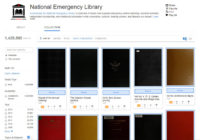 Last week Internet Archive launched the National Emergency Library which contains 1.4 million digitized books to serve the needs of students, educators, and learners. This means that they have suspended the waitlists, at least through June 30. This allows students to have the access they need to assigned readings and other library materials.
Last week Internet Archive launched the National Emergency Library which contains 1.4 million digitized books to serve the needs of students, educators, and learners. This means that they have suspended the waitlists, at least through June 30. This allows students to have the access they need to assigned readings and other library materials.
Brewster Kahle, founder of Internet Archive, says, “Think of this as a huge experiment. In one big push, we can improve online learning and its infrastructure in a way that may otherwise have taken years. This crisis encourages universities to be bold, to make investments that ultimately may mean many more students can benefit. Perhaps 500 undergraduates can fill a hall at MIT, but how many millions can take an online MIT course, once the books, materials and lessons are online?”
The library brings together all the books from Phillips Academy Andover and Marygrove College with much of Trent University’s collections. There is also over a million other books donated by other libraries to readers worldwide. Yes, worldwide. The timeline for the waitlist is timed to the crisis in the U.S., but readers all over the world are able to utilize this collection.
This launch has met with much criticism from the publishing community and writers. In a recent NPR article, it has been revealed that many writers and publishers say that the Internet Archive has been sharing full digital copies of books without permission before the establishment of this new library. The Authors Guild, which provides legal assistance to writers, stated the Internet Archive “tramples on authors’ rights by giving away their books to the world” without permission.
They recommend utilizing your own local libraries and their own e-book lending platforms instead.
